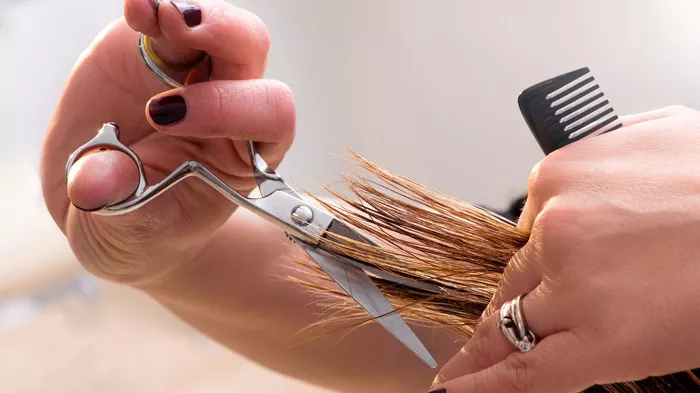Many people believe that cutting hair short can make it grow thicker and healthier. This notion has been passed down through generations, leading many to rush to the salon with hopes of revitalizing their locks. But is there any truth to this claim? In this article, we will explore the science behind hair growth, the effects of haircuts on hair thickness, and other factors that influence hair health. By the end, you’ll have a clearer understanding of whether cutting hair short truly impacts its thickness.
Understanding Hair Growth
Before we dive into the effects of cutting hair, it’s essential to understand how hair grows and what influences its thickness.
Hair Growth Cycle
Hair grows in cycles that include three primary phases:
Anagen Phase: This is the active growth phase, lasting several years. During this time, hair cells multiply, and the hair grows longer.
Catagen Phase: This is a transitional phase that lasts a few weeks, during which hair growth slows, and the hair follicle shrinks.
Telogen Phase: This is the resting phase, lasting several months, after which the hair falls out, and a new hair begins to grow.
The duration of the anagen phase varies from person to person, which is why some people have long hair while others struggle to grow it past a certain length.
Hair Structure
Hair is made up of a protein called keratin. Each hair strand has three layers:
Cuticle: The outer layer that protects the inner layers.
Cortex: The middle layer that contains melanin (pigment) and provides strength and flexibility.
Medulla: The innermost layer, present in some hair types, providing additional strength.
The thickness of hair can depend on the size of the hair follicles and the number of hair strands in a given area.
See Also: Does Hair Growth Stop at a Certain Age? Debunking Myths
The Myth of Hair Thickness and Haircuts
Hair Growth vs. Hair Thickness
One of the most significant misconceptions is that cutting hair can affect its thickness. When hair is cut, it does not change the structure or thickness of the hair follicle itself. Instead, the perception of thicker hair often arises due to the following reasons:
Blunt Ends: When hair is cut, especially if the ends are trimmed evenly, the hair appears thicker and fuller. This is due to the blunt ends reflecting light differently and creating an illusion of volume.
Damage Control: Regular trims can remove split ends and damaged hair, making the remaining hair look healthier and thicker. Healthier hair can also appear denser and shinier.
Cutting Hair and Follicle Health
Cutting hair does not impact the hair follicles located beneath the scalp. Follicle health is determined by factors such as genetics, nutrition, and overall health rather than the length of the hair above the scalp.
Factors Influencing Hair Thickness and Growth
While cutting hair doesn’t make it grow thicker, several factors play a crucial role in determining hair health, thickness, and growth.
Genetics
Genetics is one of the most significant factors affecting hair thickness and growth rate. If your parents had thick hair, you’re more likely to have thick hair as well. Conversely, those with a family history of thinning hair may find it more challenging to maintain thickness.
Diet and Nutrition
Proper nutrition is vital for healthy hair growth. Hair is primarily made of protein, so a diet rich in protein can support hair health. Important nutrients include:
Vitamins: Vitamins A, C, D, and E are essential for hair health. Biotin (Vitamin B7) is particularly known for promoting hair growth.
Minerals: Iron and zinc are crucial for maintaining healthy hair. A deficiency in these minerals can lead to hair loss or thinning.
Healthy Fats: Omega-3 fatty acids found in fish, nuts, and seeds can promote scalp health and overall hair thickness.
Hormones
Hormones play a significant role in hair growth. Changes in hormone levels, such as during pregnancy or menopause, can affect hair thickness and growth patterns. Conditions like polycystic ovary syndrome (PCOS) can also lead to hormonal imbalances that affect hair health.
Health Conditions
Certain health conditions can impact hair growth and thickness. Conditions like thyroid disorders, autoimmune diseases, and scalp infections can lead to hair thinning. Consulting with a healthcare professional can help address underlying health issues.
Hair Care Practices
The way you care for your hair can significantly impact its health and thickness. Here are some practices that can promote healthy hair growth:
Gentle Washing: Use a mild shampoo and avoid over-washing, as this can strip natural oils.
Conditioning: Regularly conditioning hair helps maintain moisture and prevents damage.
Avoid Heat: Minimize the use of heat-styling tools, as excessive heat can lead to breakage.
Scalp Massages: Massaging the scalp can stimulate blood flow to the follicles, promoting healthy growth.
Limit Chemical Treatments: Frequent coloring or perming can weaken hair, so it’s best to limit these practices.
Conclusion
In summary, cutting hair short does not make it grow thicker, as the thickness of hair is primarily determined by genetics and various health factors. While a fresh haircut can create the illusion of fuller hair due to blunt ends and the removal of damage, it does not alter the fundamental structure of hair follicles.
To promote thicker, healthier hair, focus on maintaining a balanced diet, adopting good hair care practices, and addressing any underlying health issues. By understanding the truths behind hair growth and thickness, you can make informed decisions about your hair care routine and achieve the healthy locks you desire.
You Might Be Interested In
- Sleeping with Hair Up: Pros & Cons of Hair Care During Sleep
- Does Your Hair Get Greasy If You Wash It Every Day?
- Is Hair Milk the Same as Leave-In Conditioner? Let You Know


